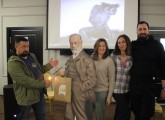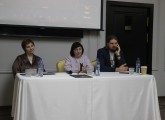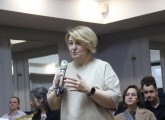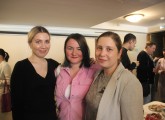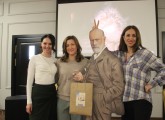RECOVERING THE DESTROYED
May 19-21, 2017 Stavropol, Russia
May 19-21, 2017, Stavropol hosted the 13th Annual Stavropol Conference arranged by the Stavropol Regional Psychoanalytical Association and the South-Russian Psychoanalytical Society for IPA candidates and members. The Conference was launched in 2005 by the SRPA and has turned into one of the Association's major projects.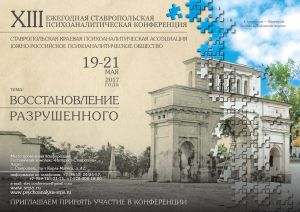
Five years ago the South-Russian Psychoanalytical Society joined its resources, too, which has had its own effect on both the structure and arrangements. The SRPA has been trying to become a full member of the EFPP while the SRPS is aimed at acquiring the status of a study-group subject to the IPA standards, so the two days of the conference are somewhat divided into a psychoanalytical and a psychotherapeutic one. This year's psychoanalytical part was represented by Christoph Walker (Entringen, Germany), a training & supervising psychoanalyst of the German Psychoanalytical Association; IPA; Deputy Director of the Han-Groen Prakken European Psychoanalytic Institute and by his co-speaker Vladislav Ermak (Rostov-on-Don, Russia), IPA member; President of SRPS. The psychotherapeutic part was delivered by Gila Ofer (Tel-Aviv, Israel), training psychoanalyst and group analyst, which is the EFPP coordinator for East-European countries, and her co-speaker Sergey Peshkov (Stavropol, Russia), Leader of the SRPA; associated member of the Society for Psychoanalytic Psychotherapy.
The participants were suggested thinking over the theme of recovering the destroyed. Human arrogance and weakness have always been the source of destruction in the nature, in the society, as well as in the development of individuals.
The theme sent everyone thinking about what plays the key role in recovering the disturbed pace of personal and social life, what helps people overcome the effects caused by catastrophes and traumatizing interaction.
Any creative activity is, in a way, reparation that resolves our internal burning ambivalence that we experience towards the external and internal objects.
Franz Kafka's works were the focus through the seminar Franz Kafka's Transformation (leaders – A. Koryoukin; M. Podoprigora). The seminar opened the conference and set the ball rolling for a discussion on destruction and recovery. The dialogue between a linguist and a psychologist offered everyone a chance to plunge into the depth of the Kafkian view on the world.
In his plenary speech Boundaries & Violations – Role of Limits for Restoration (speaker – C. Walker) a clinical case was employed to reveal the importance of being careful about the frame in a psychoanalytical study, whereas the co-speech Restoration through Transgression – transition through Via Dolorosa (co-speaker – V. Ermak) showed a potential discussion in an issue like the need for the patient to go beyond the conventional limits to reach the therapeutic aim.
The other plenary speech (Forgiving and Non-Forgiving in Groups & Society) delivered by Gila Ofer drew our attention to the finest lines in forgiving as a process in relationships including the psychoanalytical ones, which came along with a co-speech by Sergey Peshkov (Oedipal part in the process of forgiving) who viewed forgiving through the Oedipal complex as the cornerstone of the psychoanalytical theory.
Apart from the discussion groups where the participants could discuss the speeches, the conference also included work in small groups
- Clinical seminar RETURN TO THEBES; Leader – S. Abramova (Krasnodar, Russia). The leader here suggested the audience, based on the theoretical and clinical material, thinking about specifics features of sexual transference and counter-transference in work with patients who had the experience of being raised in an adoptive family.
- Seminar Destroying Therapeutic Relationships: On Work With A Psychotic Patient; Leaders – D. Sevryugin and E. Kalinina (Stavropol, Russia). Developing a therapeutic alliance with a psychotic level patient remains quite a challenge from the stance of transference relationships. And the seminar, using clinical cases, focused on the contribution that each participant makes into destroying and recovering therapeutic relationships.
- Master-class CONTAINING AND EMOTIONAL TRANSFORMATION OF A TRAUMA. BION'S APPROACH IN THERAPY; Leader – A. Koshelenko (Yekaterinburg, Russia). When working with severely damaged patients, as the speaker could see, it is possible to employ techniques based on Bion's approaches. For instance, it is useful to respond timely to the changes in the patient's psyche functioning, which is to be done through adjustment in the techniques.
- Speech & discussion Psychological Load on Child Oncologist/hematologist and Ways to reduce It. A View Through Some Psychoanalytical Psychoanalytical Concepts. Project Psychology for Doctors; Leader – A. Kudryavitsky (Moscow, Russia). The idea of the project was to offer doctors a chance to combat professional burnout through teaching them skills for resolving psychological issues that they will have to face inevitably.
- Speech & discussion Home for Superheroes. Analytical Understanding in Work With Children With Developmental Issues. Conclusions & Considerations; Leader – O. Tatarenko (Stavropol, Russia). The speech was based on summarized experience of working with children with special developmental needs. In particular, the audience could compare the psychoanalytical paradigm with other ones when helping kids.
- Seminar Large groups; Leader – Gila Ofer (Tel-Aviv, Israel). The seminar was arranged for all those who have been part of the 5th 3-year long training delivered by the SRPA in psychoanalytical psychotherapy (Basic Course); and these people already had some experience in large groups, at the Festival of Christmas-Tide Meetings, first of all. Besides, in the companies where the members of the program are employed, they have regular community meetings, which, as Gila Ofer thinks, are one of the ways to hold large groups. Due to the interest and the participants' personal impressions, the seminar proved a good and substantial talk about this interesting type of group analysis.
At the final discussion (leaders – N. Mozdor and S. Peshkov) the conclusion was drawn for the three days. The conference allowed a better understanding of the things that contribute to the development of stress resistance, as well as the role and the function of the psychoanalyst and psychotherapist through the process of recovery.
It is safe to say that the conference has been getting stronger year after year, at the same time getting more and more psychoanalytical. We may be making our small contribution in recovering the Russian psychoanalysis that was destroyed in the early 20th Century. As the participants said, the conference has taken an important place in the professional schedule followed by many colleagues from Stavropol, Krasnodar, Rostov-on-Don, and other places. And it attracts more and more people from other paces of Russia and abroad. And the thing is not about the speeches only yet also about the level of discussions held at the discussion groups, seminars, and in personal talks. And this is not just making us happy but also helps us think about how we could improve the level of the psychoanalytical culture at a single event. The participants proposed various interesting themes for the next year's conference. However, it is the people who make it interesting, so we are looking forward to meeting you again in Stavropol in the May of 2018.
Apart from the main program, there are traditionally held satellite events preceding the conference, where famous guests of Stavropol share their experience with the local experts.
On May 19, as part of the 3-year training program of SRPA on psychoanalytical psychotherapy Basic Course, an open clinical seminar was held focusing on the work with obsessive-compulsive disorders. The seminar was delivered by Christophe Walker (Entringen, Germany); Clinical Psychologist, Psychotherapist, Psychoanalyst. Training & supervising psychoanalyst of the German Psychoanalytical Association; IPA; German Society for Psychoanalysis, Psychotherapy Psychosomatics & Depth-Psychology. Ex-President of the German Psychoanalytical Association (2012-14). Deputy Director (individual training) of the Han-Groen Prakken European Psychoanalytic Institute.
The workshop brought together associate members of the SRPA as well as members of the SRPS.
Alexander Kudryavitsky (Moscow, Russia) – Clinical Psychologist; Psychologist at the Charity Foundation PODARI ZHIZN (Gift of Life). Member of the Moscow Psychoanalytical Society (IPO; MPS) held the seminar for specialists employed at the Child Oncology & Hematology department of the Stavropol Regional Clinical Hospital telling them about certain psychological aspects in a pediatric clinic of life-threatening diseases. The seminar was developed as part of the project Psychology for doctors and included the following topics
- Child Hospital through the eyes of a psychologist: patients, parents, doctors, unconscious communication in the clinic;
- manipulations and conflicts in the clinic;
- informing patients and their families: illness, treatment, preparation for manipulation, poor prognosis;
- the Balint group.
Psychologists were invited to the seminar, who have to face life-threatening conditions in their work.
Particularly interesting was the approach to informing doctors about intrapsychic and interpersonal processes, with an appeal to the theories of W. Bion, M. Klein, D. Winnicott and S. Freud.
Sergey Ivanov (Stavropol, Russia) – Psychotherapist of Stavropol Regional Psychiatric Hospital #2; IPA Candidate; SRPA associated member; member of SRPS; member of the Programme Committee
Sergey Peshkov (Stavropol, Russia) – associated member of the Society for Psychoanalytic Psychotherapy; SRPA associated member; Leader of SRPA; Co-chair of the Programme Committee





